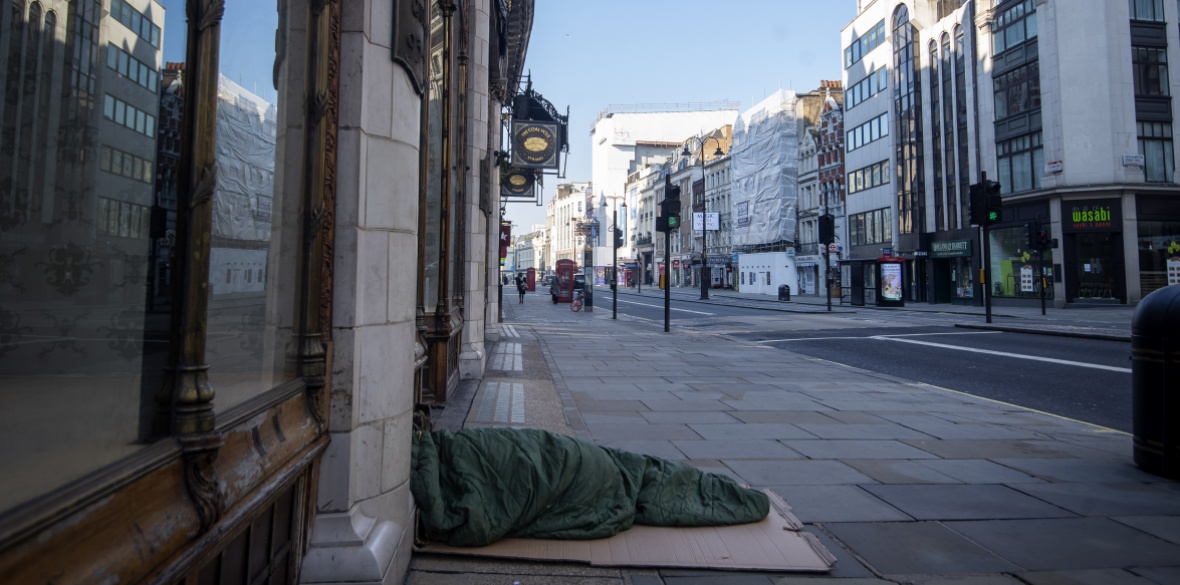This is the last article you can read this month
You can read more article this month
You can read more articles this month
Sorry your limit is up for this month
Reset on:
Please help support the Morning Star by subscribing here
MANY people are at risk of being “pushed to the brink of homelessness” during the lockdown, charities have warned, with signs that some have already been forced onto the streets since the anti-coronavirus measures took effect.
Jon Glackin, founder of grassroots group Streets Kitchen, told the Morning Star today that he had seen a “significant” number of newly homeless people while distributing food in London.
Although it was difficult to gauge how many were new, said Mr Glackin, he had spoken to people who had been made homeless since the lockdown measures were put in place.
“We’re recognising a problem, but we don’t yet know the scale of the problem,” he said.
“People have been illegally evicted. People on low incomes who were staying in B&Bs, even backpacker hostels, they’ve all been kicked out too — sofa surfing. People want their own space now if they can have it.”
Although the government has placed a three-month ban on evictions, there have been reports of unscrupulous landlords kicking out tenants regardless.
Ealing Soup Kitchen manager Andrew Mcleay told the Independent earlier this week that he was aware of at least two people who had been evicted from their homes during the lockdown and were now sleeping on the streets.
Crisis chief executive Jon Sparkes said that while he welcomed the government’s eviction ban and mortgage holiday schemes, he stressed that local authorities needed more support to “tackle illegal evictions and keep people safely housed.”
He warned: “We know that many people are living with huge financial pressures and are at serious risk of being pushed over the brink into homelessness as a result of the coronavirus outbreak if the right support isn’t provided.”
The prospect of a second wave of homelessness follows claims that there are still thousands sleeping on the streets, despite government promises to house all rough sleepers.
On March 27, the Ministry of Housing, Communities and Local Government (MHCLG) wrote to local councils in England saying they must find accommodation for all rough sleepers by that weekend, and pledging £3.2m in funding to support this effort.
So far 1,000 people in the capital have been put up in hotels, according to City Hall, while hundreds more have been moved to accommodation in other parts of the country.
However, Mr Glackin warned that this number may represent only a fraction of those sleeping rough in the capital. Figures last year showed that there were 3,985 people on the streets between July and September.
“We operate every night around London and we’re still seeing people there. Not everyone has been brought in,” he said.
“I don’t think people should be patting themselves on the back thinking that the problem has been solved. Once that attitude steps in, it’s a problem.”
Of those left behind, many are likely to be migrants, said the Public Interest Law Centre (PILC).
This is because some councils are still adhering to normal homeless rules such as requiring proof of immigration status.
On Tuesday, PILC wrote to local authorities urging them to instruct front-line staff to provide care to everyone, regardless of immigration status.
Benjamin Morgan, who runs the homeless rights project at PILC, said the government had failed to give clear guidance to councils on how to support migrant rough sleepers.
“MHCLG and the Home Office bear much of the responsibility for this failure,” he told the Morning Star.
“There is a clear and urgent need for central government to take steps to make it easier for local authorities to provide support.”
However, Mr Morgan added that councils were also partly to blame for “using this lack of clarity from central government as a pretext to withhold accommodation from those who urgently need it, including people with symptoms of Covid-19.”
He warned that the ongoing failure to provide accommodation to all rough sleepers was not only a “moral failure” but also posed a “serious public health risk,” as vulnerable people are being left unable to self-isolate.
As the lockdown continues into its fourth week, volunteers have warned that life on the streets is getting even tougher.
Homeless people can no longer access toilets in cafes and libraries or find warm places to sleep such as on public transport.
Food is also more scarce, due to a drastic drop in support from charities and the closure of day centres.
Mr Glackin said that even water is now difficult to come by.
“We’ve had reports in Hackney of people having to drink toilet water because they couldn’t find water,” he said.
“We’re having to give out water because there’s so much of a need.”
A government spokesperson claimed that over 90 per cent of rough sleepers known to local authorities at the start of the coronavirus crisis had received offers of safe accommodation.











